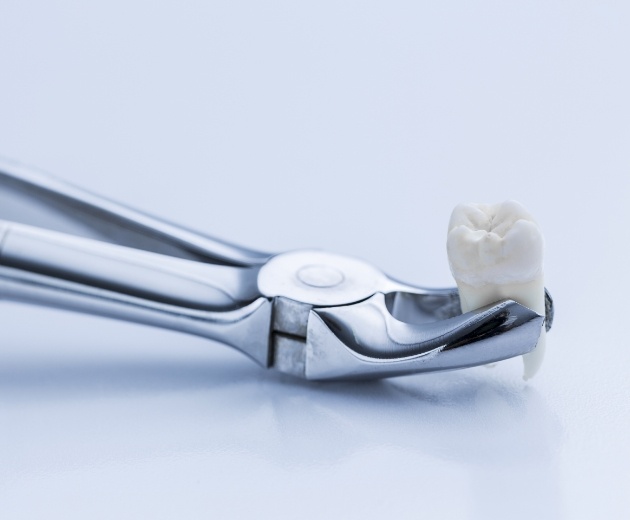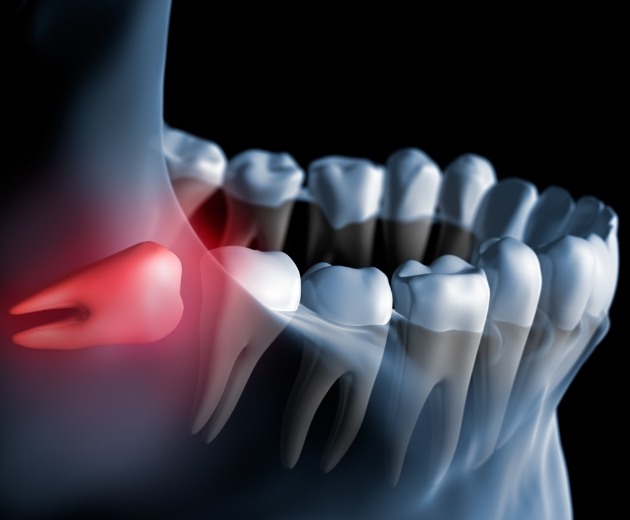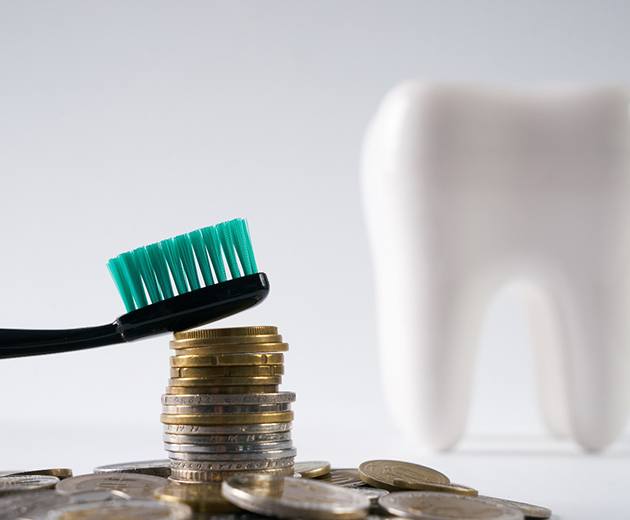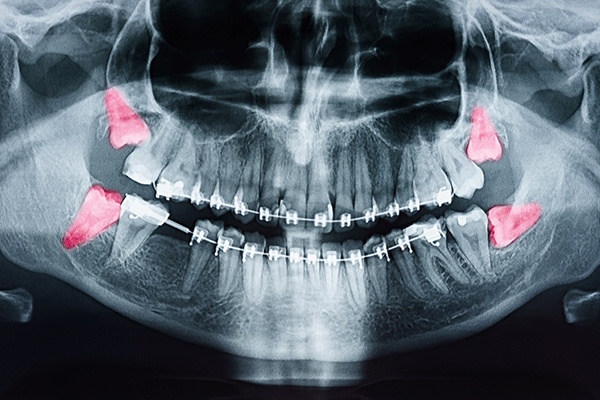Wisdom Teeth Extractions – Burke, VA
Preventing Future Problems
by Removing Wisdom Teeth
Many patients wonder why dentists and oral surgeons recommend removing wisdom teeth, also known as third molars, so frequently. The answer is, in many cases, these teeth can cause more problems than they’re worth, leading to jaw pain, crowded teeth and other orthodontic problems, and even infections. If your general dentist lets you know that your wisdom teeth need to be extracted or they’re impacted, give our team at Northern Virginia Oral, Maxillofacial & Implant Surgery a call today to get the best care possible for your wisdom teeth extractions in Burke!
Why Choose Northern Virginia Oral, Maxillofacial & Implant Surgery for Wisdom Teeth Extractions?
-
We Remove Impacted
Wisdom Teeth -
Accepting & Maximizing
Dental & Medical Insurance -
Team of Skilled,
Experienced Oral Surgeons
Indications for Wisdom Tooth Removal

While some people may be able to keep their wisdom teeth and experience no negative impact from allowing them to grow in, others may need them to be extracted to prevent future oral health issues from arising. Some common reasons why third molars are recommended to be extracted include:
- They’re impacted below the gumline and within the jawbone, meaning they can’t erupt into the mouth.
- They’re only partially emerged through the gums.
- They present a high risk of becoming infected.
- There’s not enough room within the mouth to allow them to grow in, resulting in crowded or damaged teeth.
- They’re causing pain or poor oral health.
Impacted
Wisdom Teeth

If your wisdom teeth are impacted below the gumline, it’s necessary that you visit a qualified oral surgeon to have them removed to avoid complications. At Northern Virginia Oral, Maxillofacial & Implant Surgery, we’ve helped hundreds if not thousands of patients find relief from wisdom tooth pain. In order to remove these hidden third molars, we’ll make a small incision within the gumline that will allow us to separate the teeth into smaller, easily removable pieces. Having impacted teeth removed will help minimize your risk of infection and prevent future orthodontic issues from developing.
What to Expect After a Wisdom Tooth Extraction

Recovering from wisdom tooth surgery can take an average of three days to a week depending on your unique case. It’s crucial to avoid strenuous exercise, using a straw, spitting, and eating hard or crunchy foods for the days following your surgery to ensure the blood clot stays intact within your mouth. This will allow the gums to fully heal and help you avoid any pain associated with dry sockets. Please call us if you notice pain that’s increasing in intensity, swelling, or excessive bleeding.
Understanding the Cost of Wisdom Tooth Extractions

We understand that finances are often the most stress-inducing part of any dental procedure, even wisdom tooth extractions. You may therefore be happy to learn that we’re currently offering a special on wisdom tooth financing that could make the cost of care more manageable.
We’ll give you a detailed, accurate estimate of what your wisdom tooth extraction should cost when we meet you, but before then, here’s some information that can help you budget for the treatment.
Factors That Can Impact the Cost of Wisdom Tooth Extractions

It’s not necessarily possible to tell you exactly what your tooth extraction is going to cost you without understanding your unique situation. That’s because there are several factors that can affect the procedure’s price.
The first is how many wisdom teeth you’ll have to take out—not everyone has all four of them. Some wisdom teeth may also be impacted, i.e., stuck beneath the gums without being able to sprout properly. These teeth are more difficult to remove, adding complexity and cost to the surgery
Most people also use some kind of anesthetic for the procedure. Dental sedatives each have their own price point that you weigh carefully before the procedure.
Does Dental Insurance Cover Wisdom Tooth Extractions?

While not every dental plan will pay for dental surgeries, most will cover at least a portion of your wisdom tooth extraction. This is, of course, provided you’ve both met your deductible and have yet to exceed your yearly maximum. We’ll coordinate with your dental plan in order to determine what kind of benefits you’ll be able to get for this procedure.
Other Options for Making Wisdom Tooth Extractions Affordable

We also have options available for those patients without dental insurance. As we mentioned previously, we’re working with CareCredit to offer special 0% monthly financing for patients who qualify, which may make getting necessary care much more budget friendly. With this in mind, you can have one less thing to worry about going into your wisdom tooth extraction.
Wisdom Tooth Extractions FAQs
When Do Wisdom Teeth Usually Arrive?
Typically, third molars develop during late adolescence or early adulthood. As a result, wisdom teeth are usually removed when a person is between the ages of 16 and 25. Especially during this stage in life, it’s important to continue to see your dentist regularly. In routine X-rays, they can identify whether these third molars could be harmful for your smile and refer you to our team. Then, we can confirm whether extraction is necessary and carry it out skillfully. We will be happy to guide you through this transitional stage and protect your oral health moving forward.
What Is the Purpose of Wisdom Teeth?
Anciently, humans ate harder and rougher foods in their diet. As a result, they needed another set of molars to chew, especially if they lost a tooth or two early to decay or injury. Nowadays, people’s diets are softer, their mouths are smaller, and better oral hygiene leads to less tooth loss. In many cases, this extra set of molars simply isn’t needed, and there isn’t enough room in the mouth to accommodate them.
Why Should You Work with an Oral Surgeon to Remove Your Wisdom Teeth?
Some general dental practices may offer extraction services, but the procedure really should be handled by a specialist. When a dentist refers a patient to us, it’s because we are experts in this area of the field! Choosing an oral surgeon for this treatment ensures that even if you have a complex case, the extraction(s) will be done correctly and safely. As a result, you’ll be less likely to experience complications from your surgery, as long as you follow our post-op instructions.
Does Wisdom Tooth Extraction Hurt?
At our practice, we take every available step to make sure you stay at ease and pain free at each stage. In addition to giving you a local anesthetic, which will numb the area, we can offer sedation options ranging from mild nitrous oxide all the way through general anesthesia. During your consultation, we can discuss your concerns and select a method that will keep you comfortable throughout the procedure. When you return home and as you recover, you may feel sore and experience some mild pain, but it can usually be managed with over-the-counter pain medication and a cold compress. If the pain gets worse or is accompanied by a fever, contact us right away.
How Do You Sleep After Wisdom Teeth Removal?
If you’ve had oral surgery before, then you know that it can be challenging to sleep well for the first few nights. Don’t worry – that’s where the aftercare instructions we provide come in. Although it may seem insignificant, steps like using a cold compress for 10 minutes at a time, avoiding spicy, acidic, and sugary foods, keeping your head elevated, and taking OTC pain medication as directed will go a long way in keeping you comfortable.
Tip: If you can, have an adult you know and trust stay with you for the first night. That way, they can check on you periodically, change the gauze pads as needed, and remind you when to take your medication.
Does Everyone Have Wisdom Teeth?
According to an article published in the Dental Research Journal, the answer is “no.” In fact, upwards of 37% of patients are missing at least one of their wisdom teeth. Although the exact reason why is unknown, it’s believed that genetics plays an important role. So, if your parents or grandparents never had a third set of molars come in, you may not either!
Should Wisdom Teeth Be Removed If They Don’t Hurt?
Patients who aren’t experiencing persistent pressure or chronic jaw pain are often surprised to hear that they need their wisdom teeth removed. If that’s the case for you, it’s important to remember that, even if you aren’t experiencing any discomfort right now, that doesn’t mean your third set of molars won’t cause problems in the future. In fact, not extracting them can lead to everything from infection and cysts to frequent headaches and orthodontic issues.
With all of that said, don’t hesitate to share any questions or concerns you have with your oral surgeon in Burke. That way, they can provide helpful answers, share further insight, and help you feel confident moving forward with your treatment plan.
How Soon Can I Eat After Wisdom Teeth Removal?
It’s important that you wait at least an hour. After all, the gauze pads need to stay in place immediately following the procedure to slow down the bleeding. Plus, eating before you regain full sensation in your mouth can lead to a serious (and painful!) soft tissue injury.
Once you do get the green light to eat, make sure to stick to foods that don’t require any chewing, like seedless fruit smoothies, plain yogurt, and applesauce. As you heal, you’ll be able to progress to more substantial foods, like mashed potatoes, cooked pasta, and oatmeal. Around the one-week mark, you should be able to resume your usual diet.
Why Are Wisdom Teeth Called That?
Since wisdom teeth have a reputation for being more harmful than helpful, you might be wondering how they earned their nickname. While the exact reason is unknown, the prevailing theory is that it has to do with when they emerge (early adulthood). Since wisdom comes with age, the third and final set of molars was called “wisdom teeth.”
